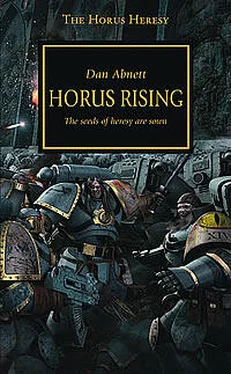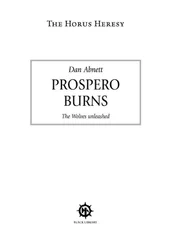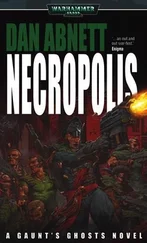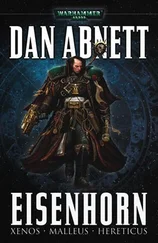Dan Abnett - The Horus Heresy - Horus Rising
Здесь есть возможность читать онлайн «Dan Abnett - The Horus Heresy - Horus Rising» весь текст электронной книги совершенно бесплатно (целиком полную версию без сокращений). В некоторых случаях можно слушать аудио, скачать через торрент в формате fb2 и присутствует краткое содержание. Жанр: Фантастика и фэнтези, на английском языке. Описание произведения, (предисловие) а так же отзывы посетителей доступны на портале библиотеки ЛибКат.
- Название:The Horus Heresy: Horus Rising
- Автор:
- Жанр:
- Год:неизвестен
- ISBN:нет данных
- Рейтинг книги:4 / 5. Голосов: 1
-
Избранное:Добавить в избранное
- Отзывы:
-
Ваша оценка:
- 80
- 1
- 2
- 3
- 4
- 5
The Horus Heresy: Horus Rising: краткое содержание, описание и аннотация
Предлагаем к чтению аннотацию, описание, краткое содержание или предисловие (зависит от того, что написал сам автор книги «The Horus Heresy: Horus Rising»). Если вы не нашли необходимую информацию о книге — напишите в комментариях, мы постараемся отыскать её.
The Horus Heresy: Horus Rising — читать онлайн бесплатно полную книгу (весь текст) целиком
Ниже представлен текст книги, разбитый по страницам. Система сохранения места последней прочитанной страницы, позволяет с удобством читать онлайн бесплатно книгу «The Horus Heresy: Horus Rising», без необходимости каждый раз заново искать на чём Вы остановились. Поставьте закладку, и сможете в любой момент перейти на страницу, на которой закончили чтение.
Интервал:
Закладка:
They were provided with excellent accommodation in the western part of the city, in a quarter known as the Extranus, where, they were politely informed, all 'strangers and visitors' were reserved and hosted. Xenobia Principis was a place designed for trade delegations and diplomatic meetings, with the Extranus set aside to keep guests reserved in one place. They were handsomely provided with meturge players, household servants, and court officers to see to their every need and answer any questions.
Under the guided escort of abbrocarii, the Imperials were allowed beyond the shaded compound of the Extranus to visit the city. In small groups, they were shown the wonders of the place: halls of trade and industry, museums of art and music, archives and
libraries. In the green twilight of the galleried streets, under the hissing canopy of the trees, they were guided along fine avenues, through splendid squares, and up and down endless flights of steps. The city was home to buildings of exquisite design, and it was clear the interex possessed great skill in both the old crafts of stonemasonry and metalwork, and the newer crafts of technology. Pavements abounded with gorgeous statuary and tranquil water fountains, but also with modernist public sculpture of light and sonics. Ancient lancet window slits were equipped with glass panels reactive to light and heat. Doors opened and closed via automatic body sensors. Interior light levels could be adjusted by a wave of the hand. Everywhere, the soft melody of the aria played.
The Imperium possessed many cities that were larger and grander and more cyclopean. The super-hives of Terra and the silver spires of Prospero both were stupendous monuments to cultural advancement that quite diminished Xenobia Principis. But the interex city was every bit as refined and sophisticated as any conurbation in Imperial space, and it was merely a border settlement.
On the day of their arrival, the Imperials were welcomed by a great parade, which culminated in their presentation to the senior royal officer of Xenobia, a 'general commander' named Jephta Naud. There were high-ranking civil officers in the interex party too, but they had decided to allow a military leader to oversee the summit. Just as Horus had diluted the martial composition of his embassy to impress the interex, so it had brought its military powers to the fore.
The parade was complex and colourful. Meturge players marched in great numbers, dressed in rich formal robes, and performed skirling anthems that were as much non-verbal messages of welcome as they were
mood-setting music. Gleves and sagittars strode in long, uniform columns, their armour polished brightly and dressed with garlands of ribbons and leaves. Behind the human soldiery came the kinebrach auxiliaries, armoured and lumbering, and glittering formations of robotic cavalry. The cavalry was made up of hundreds of the headless artificial horses that had featured in the envoys' honour guard. They were headless no longer. Sagittars and gleves had mounted the quadruped frames, seating themselves where the base of the neck would have been. Warrior armour and robot technology had fused smoothly, locking the 'riders' in place, their legs folded into the breastbones of the steeds. They were centaurs now, man and device linked as one, myths given technological reality.
The citizenry of Xenobia Principis came out in force for the parade, and cheered and sang, and strewed the route of the procession with petals and strips of ribbon.
The parade's destination was a building called the Hall of Devices, a place which apparently had some military significance to the interex. Old, and of considerable size, the hall resembled a museum. Built into a steep section of the bay slopes, the hall enclosed many chambers that were more than two or three storeys high. Plunging display vaults, some of great size, showed off assemblies of weapons, from forests of ancient swords and halberds to modern motorised cannons, all suffused in the pale blue glow of the energy fields that secured them.
The hall is both a museum of weapons and war devices, and an armoury.’ Jephta Naud explained as he greeted them. Naud was a tall, noble creature with complicated dermatoglyphics on the right side of his face. His eyes were the colour of soft gold, and he wore silver armour and a cloak of scalloped red metal links that made a sound like distant chimes when he moved. An
armoured officer walked at his side, carrying Naud's crested warhelm.
Though the Astartes had come armoured, the War-master had chosen to wear robes and furs rather than his battle-plate. He showed great and courteous interest as Naud led them through the deep vaults, commenting on certain devices, remarking with delight when archaic weapons revealed a shared ancestry.
They're trying to impress us.’ Aximand murmured to his brothers. A museum of weapons? They're as good as telling us they are so advanced... so beyond war... they've been able to retire it as a curiosity. They're mocking us.’
'No one mocks me.’ Abaddon granted.
They were entering a chamber where, in the chilly blue field light, the artifacts were a great deal stranger than before.
'We hold the weapons of the kinebrach here.’ Naud said, to meturge accompaniment. 'Indeed, we preserve here, in careful stasis, examples of the weapons used by many of the alien species we have encountered. The kinebrach have, as a sign of service to us, foresworn the bearing of arms, unless under such circumstances as we grant them said use in time of war. Kinebrach technology is highly advanced, and many of their weapons are deemed too lethal to be left beyond securement.’
Naud introduced a hulking, robed kinebrach called Asherot, who held the rank of Keeper of Devices, and was the trusted curator of the hall. Asherot spoke the human tongue in a lisping manner, and for the first time, the Imperials were grateful for the meturge accompaniment. The baffling cadences of Asherot's speech were rendered crystal clear by the aria.
Most of the kinebrach weapons on display didn't resemble weapons at all. Boxes, odd trinkets, rings, hoops. Naud clearly expected the Imperials to ask questions
about the devices, and betray their warmongering appetites, but Horus and his officers affected disinterest. In truth, they were uneasy in the society of the indentured alien.
Only Sindermann expressed curiosity. A very few of the kinebrach weapons looked like weapons: long daggers and swords of exotic design.
'Surely, general commander, a blade is just a blade?' Sindermann asked politely. These daggers here, for instance. How are these weapons "too lethal to be left beyond securement"?'
They are tailored weapons.’ Naud replied. 'Blades of sentient metal, crafted by the kinebrach metallurgists, a technique now utterly forbidden. We call them anathames. When such a blade is selected for use against a specific target, it becomes that target's nemesis, utterly inimical to the person or being chosen.’
'How?' Sindermann pressed.
Naud smiled. The kinebrach have never been able to explain it to us. It is a factor of the forging process that defies technical evaluation.’
'Like a curse?' prompted Sindermann. An enchantment?'
The aria generated by the meturge players around them hiccupped slightly over those words. To Sinder-mann's surprise, Naud replied, 'I suppose that is how you could describe it, iterator.’
The tour moved on. Sindermann drew close to Loken, and whispered, 'I was joking, Garviel, about the curse, I mean, but he took me seriously. They are enjoying treating us as unsophisticated cousins, but I wonder if their superiority is misplaced. Do we detect a hint of pagan superstition?'
THREE
Impasse
Illumination
The wolf and the moon
Читать дальшеИнтервал:
Закладка:
Похожие книги на «The Horus Heresy: Horus Rising»
Представляем Вашему вниманию похожие книги на «The Horus Heresy: Horus Rising» списком для выбора. Мы отобрали схожую по названию и смыслу литературу в надежде предоставить читателям больше вариантов отыскать новые, интересные, ещё непрочитанные произведения.
Обсуждение, отзывы о книге «The Horus Heresy: Horus Rising» и просто собственные мнения читателей. Оставьте ваши комментарии, напишите, что Вы думаете о произведении, его смысле или главных героях. Укажите что конкретно понравилось, а что нет, и почему Вы так считаете.












